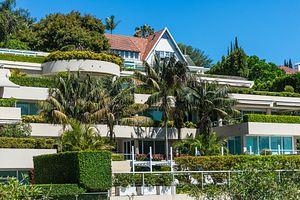Chinese money has been pouring into Australia for a while, but never to the extent it is now. Much of it is “black money” – often from corrupt officials seeking to park their gains somewhere a Chinese government increasingly perturbed by corruption won’t so easily trace it. The money has been blamed for overheating the Australian property market, and while that claim is not new the racist protests are a new twist.
Australians and the relative few who watch this country may remember Pauline Hanson’s first forays into politics as One Nation leader. The Queensland native’s platform, such as it was, seemed bigoted: against special welfare payments for Indigenous people and more broadly anti-Asian immigration, multiculturalism, and foreign investment. The Japanese have long had business interests in holiday areas around the Great Barrier Reef.
Now again there are angry protests about Asian ownership in Australia. A racist group sent flyers out to Sydney suburbs suggesting it was time to Stop the Chinese Invasion and according to The Sydney Morning Herald, that “greedy foreign invaders” are “pricing locals out of the market.” Now there has been a protest, and toothless and silly as it seemed (one man was photographed in what looked like his wife’s dressing gown and a conical hat), it showed that many Australians are increasingly concerned about the effect of Chinese buyers on the real estate market. As we have previously reported the average housing price is now AUD1 million ($770,000).
But there is more to it than one-note xenophobia. Treasurer Joe Hockey in March forced Chinese property billionaire Xu Jiayin to sell his AUD39 million Sydney mansion. Says Fairfax, “the Treasurer wanted to demonstrate that he was serious about stopping foreigners from evading ownership restrictions and inflating the bubbling market.” Both of these are serious concerns, as is the amount of “black money” pouring out of China’s corrupt official’s accounts and into an already over-heated Australian property market.
Australian Prime Minister Tony Abbott managed to tell Parliament recently that he hoped house prices would keep rising, albeit modestly. Given this is the very thing that is locking younger Australians out of the property market and undercutting that central tenet of his own party’s version of the Australian Dream it seems an odd thing to say, but it’s still better than knighting Prince Philip.
And, as Michael West asked in his Monday column, how are millions of dollars to buy a house taken out of a country that imposes a $50,000 limit?
This is not simply the “fault” of wealthy Chinese. Negative gearing doesn’t exactly help. Neither do low interest rates, something the Treasury Secretary and RBA noted just the other day. However, wealthy Chinese laundering money through Australian property purchase has become a problem and has turned, says Fairfax’s John Garnaut, from a trickle into a flood since the early 1990s.
Anti-money laundering laws being moved into their second stage and targeting real estate is what’s needed, but they haven’t been enacted yet and aren’t popular with real estate agents as it requires them to look more closely into buyers and where their money is coming from. Given China’s poor transparency this is already problematic: Where and how do people get their money from? It’s not a question one can always ask within China with a good chance of success.
This is coming at the same time that China is upping its anti corruption campaign. Last month China released a list of its top 100 most-wanted fugitives, largely officials wanted for financial crimes such as embezzlement or bribery. According to the list, part of Sky-Net, there are ten in Australia. Unsurprisingly, most work in government or for state-owned enterprises. Sky-net is part of a wider Operation Fox Hunt.
China’s corruption crackdown has been some time coming. However the ten people listed as living in Australia mostly fled years ago and have been traced across Australia: Sydney, Melbourne, Adelaide and Perth (the man in question allegedly roughed up a Fairfax reporter who visited him in the far southern suburbs and protested his innocence).
There is something of a quandary here, although it is wise not to completely conflate property and high-level corruption: Australian politicians are wary of sending those officials back to China thanks to the death penalty and opaque legal system. Though Xi Jinping is serious about combatting corruption such a cleanup usually stratifies power, also. This political theatre has little mileage for many here. China sending agents to speak with tour bus driver Dong Feng and ask him to return to China (pressuring relatives still there is another tactic) without going through proper channels has irritated officials in Australia.
The racists in question have missed the point, but the government is realizing more must be done even if the prime minister, who owns a house in Sydney, is happy about the rising house prices.
Helen Clark was based in Hanoi for six years as a reporter and magazine editor. She has written for two dozen publications including The Diplomat (as Bridget O’Flaherty), Time, The Economist, the Asia Times Online and the Australian Associated Press.

































